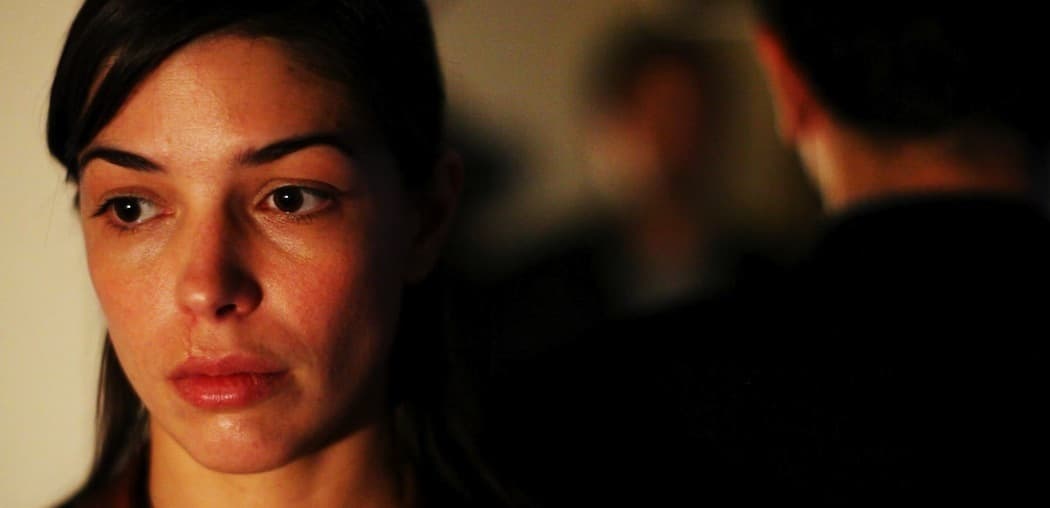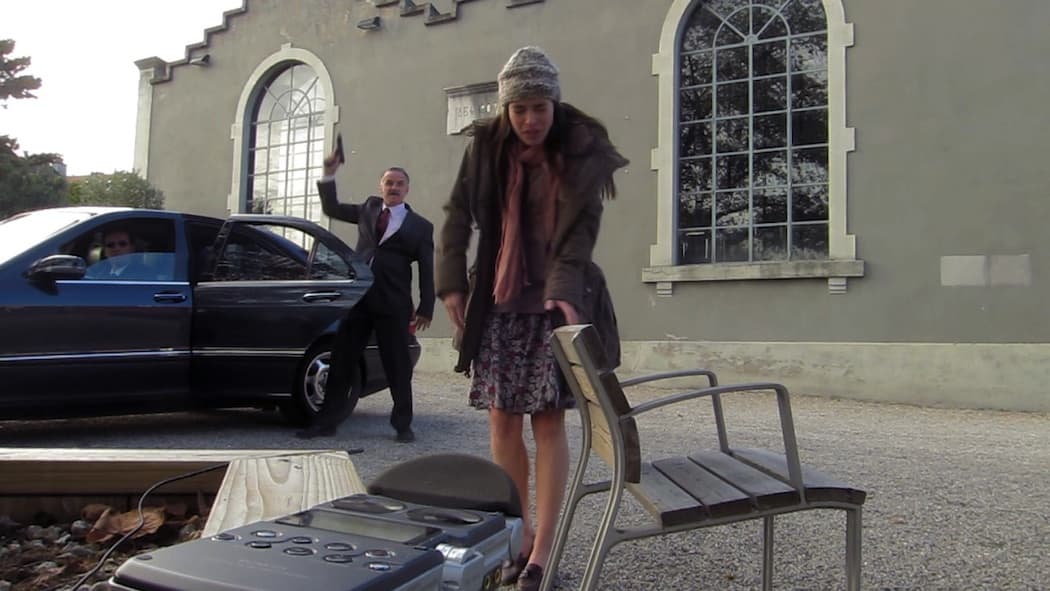Advertisement
Jean-Luc Godard Says 'Goodbye To Language' — In 3D, No Less

In 1960, Jean-Luc Godard’s “Breathless” changed the way we look at movies. Naughty, rough-edged, steeped in both high-minded existentialism and lowbrow pulp fiction, this deliriously playful picture broke every rule of classical filmmaking that audiences had been trained to take as gospel, radically liberating the form. I suppose to jaded modern eyes it probably seems quaint, as Godard’s rapid-fire jump-cuts, meta-textual references and free-wheeling handheld camerawork have since been so absorbed into the everyday vernacular of contemporary filmmaking it feels like they’ve always been there. But at the time “Breathless” was pure punk rock.
And now, more than half-a-century later, the 83-year-old Godard is at it again. His “Goodbye To Language 3D” won the Grand Jury Prize at last summer’s Cannes Film Festival before opening in New York City this past October to rapturous reviews and sell-out crowds. Six months later, it’s still playing in Manhattan — a nearly unprecedented and hugely heartening miracle considering the dire straits of foreign film distribution these days, when subtitled movies are lucky to get a week in theaters before being banished to the bottom of your Video On Demand menu.
At long last arriving this week at the Kendall Square Cinema, “Goodbye To Language 3D” is the wonky cinephile’s equivalent of the new “Avengers” flick or that upcoming “Star Wars” sequel. It’s a bona fide art=house “blockbuster event movie.”
It’s also Godard being Godard, which depending on your tolerance for his singular sort of antics is either a very good or a very bad thing indeed. Conventional wisdom dictates that Jean-Luc Godard lost his mind roughly halfway through 1968’s semi-apocalyptic capitalism-as-cannibalism epic “Weekend,” and he hasn’t told what anyone would technically consider “a story” again ever since.
After churning out at least half-a-dozen, seemingly effortless groundbreaking masterpieces in the immediate wake of “Breathless” (“Band Of Outsiders,” “Contempt,” “Alphaville,” “Vivre Sa Vie,” “Pierrot Le Fou,” the list goes on) our ever-restless Godard finally just blew up the whole damn medium, cheekily ending “Weekend” not with the traditional French title card “Fin,” but instead “Fin De Cinema.”
It was an announcement that movies — at least the way we know them — were over for him, and the next forty-odd years have found Godard tearing down the component parts, arranging and rearranging visual and audio collages, experimenting with video, forsaking traditional narrative and fragmenting motion pictures into something more like installation art. Truth be told, I’m not the biggest fan of this later work. A lot of it feels scoldy and humorless, weirdly preoccupied with Hitler and Marxism while sadly lacking the puckish spirit that made those earlier efforts such a scream.
Advertisement
But I’ve always enjoyed the idea that Jean-Luc Godard is still out there, still messing around with the form and still trying to reinvent movies again the way he did so indelibly back in 1960.

Those decades of effort provide the subtext for “Goodbye To Language 3D,” a hugely entertaining and almost entirely inscrutable lark, one which finds the filmmaker fooling around with a new frontier of stereoscopic photography in a full-on seventy-minute sensory assault about a guy, a girl, another guy, another girl, and a very adorable dog, contemplating the infinite to no avail. I’m still not sure if I can even tell you what actually happens in this picture, but I can’t wait to see it again.
It’s a really funny movie, though be forewarned it comes at you as a jumble. 3D photography requires two cameras placed roughly as far apart as your eyes, filming the same thing at the same time with the images later overlaid to create the false perception of an extra dimension. Godard runs with this thematic notion of overlapping doubles, zipping through the same quote-unquote story twice, casting actors who look distractingly alike to play out the almost-same scenarios twice in sets that look familiar, but are just a bit off from one another. He breaks these doubles into chapters dubbed, “La Nature” and “Le Metaphor” but then intercuts them so much you’ll be hard pressed to tell who is who and which is which. Or at least I was, probably because my head was swimming.
It only took a couple of years for 3D to go from a brave new world to junky afterthought, the provenance of cheapjack superhero movie post-conversions that want to rob you of a few more bucks at the ticket counter while dimming the colors unforgivably. The few great filmmakers who have experimented with the format use it to give an illusion of depth within the frame (think of those wonderful, endless train-station hallways in Martin Scorsese’s “Hugo.”)
Godard totally shoves stuff in your face. There’s an entire monologue I missed here because the collar of a woman’s jacket was jutting out four rows deep into the auditorium. Whatever James Cameron’s initial manual was for how to subtly integrate 3D into the moviegoing experience has been totally disregarded here. Foreground objects loom so large touching your nose, you’ll be trying to look around them to see the actors buried somewhere behind. It’s a confrontational approach. Once again, totally punk rock.
In classic Godard fashion, a lot of the movie is people staring blankly into the camera, reciting oddball aphorisms that range from provocative to inane to somewhere in between. (“Television was invented the same year Hitler was democratically elected.”) Deafening classical music stings swell on the soundtrack and then abruptly cease, ambient sounds cutting in and out. His cheeky trademark title cards (so recently ripped-off in “Birdman”) keep coming back, but this time piled on top of one another in 3D. “ADIEU” (goodbye), “AH, DIEUX” (oh, gods), “A DEUX” (a two).

Beautiful naked women smoke cigarettes and spout Marxist rhetoric. A mysterious man sits on a park bench scrolling through Aleksandr Solzhenitsyn quotes on his iPhone. Howard Hawks’ “Only Angels Have Wings” is playing on a widescreen TV in the background. There are a bunch of shady Germans zooming around in a Mercedes shooting people, because of course there are.
One of the male leads references Rodin’s “The Thinker,” and then perches upon a toilet with his chin resting in his fist, all further philosophical musings drowned out by deafening surround-sound diarrhea farts. “In poop we are all equal,” he proclaims, and it’s hard not to bust a gut realizing that Jean-Luc Godard has spent more than half the century of cinema building up to a big-screen adaptation of “Everyone Poops.” (He must be a big fan of "Jackass 3D.")

“Is it possible to produce a concept of Africa?” a woman asks, more than once during the film. Tellingly, Godard never tries to answer and just lets the question repeat throughout. Some things are too big, some suffering too great, and there are concepts too incomprehensible to be contained within something as small as a movie. So Godard gives a large part of the film over to his scampering mutt, Roxy (yes, the director’s own dog) who merely eats, sleeps and craps to a most captivating effect, blissfully untroubled by the philosophical quandaries of his co-stars.
Roxy actually gets a couple of moments that look like Monet paintings. The Philosopher King who licks his own balls, the hero of this movie.
“Goodbye To Language 3D” has a weird air of both surrender and rejuvenation. It ends with the sound of babies crying. This is either a new cinema being born, or another bunch of diapers that’ll need to be changed. Roxy doesn’t care either way. Adieu.

